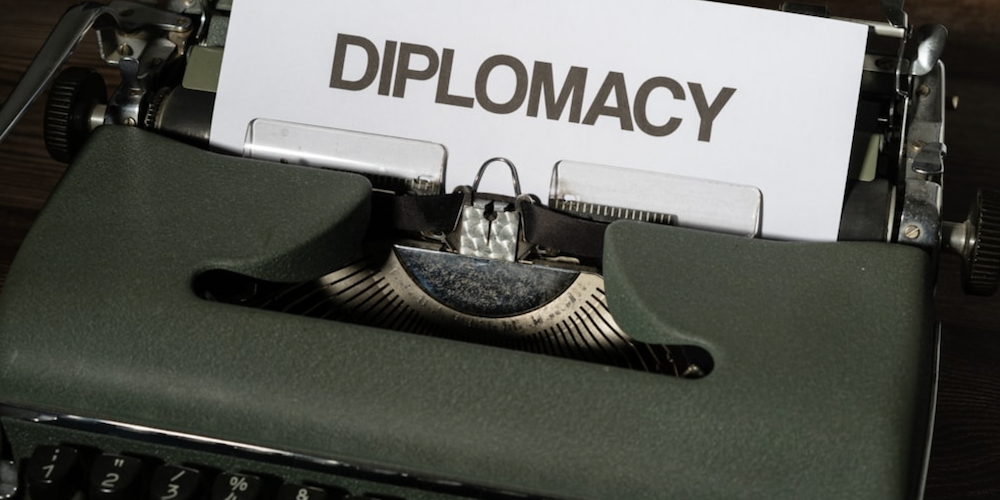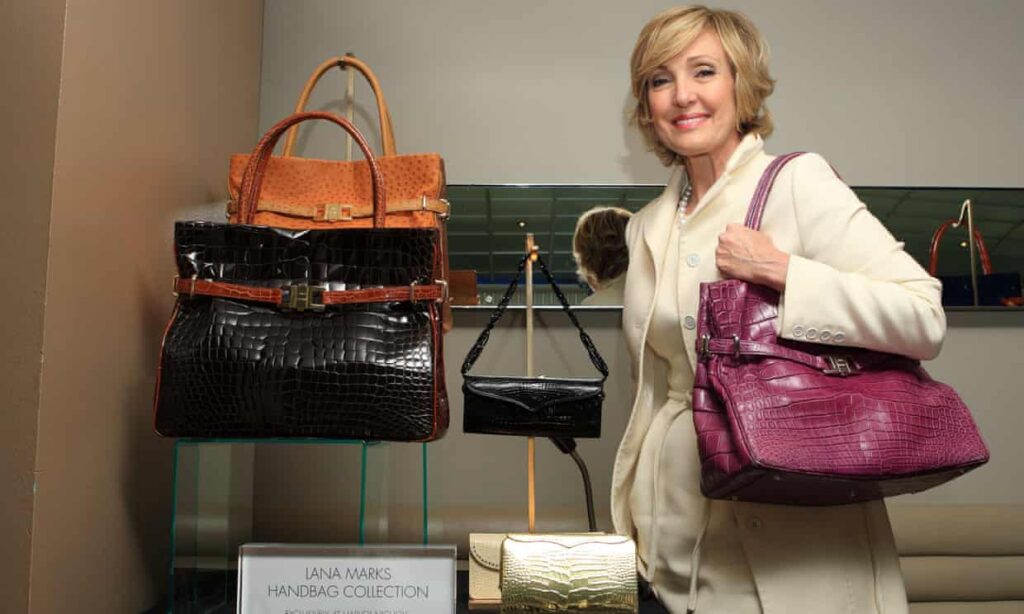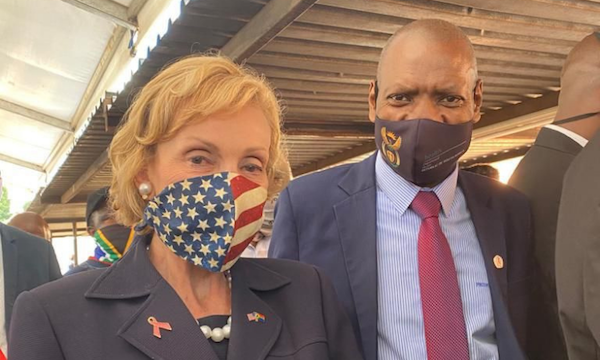
How Political Ambassadors Waste Taxpayer Dollars
A Trump envoy spent up to $1 million on a second official residence. She left office last week but remains in the primary ambassadorial residence.
By NICHOLAS KRALEV and ROBIN HOLZHAUER | JANUARY 24, 2021

The U.S. ambassador to South Africa in the last year of the Trump administration, Lana Marks, compelled the State Department to spend as much as $1 million of taxpayer funds on establishing and renovating a second official residence she never occupied, nearly 1,000 miles from the embassy in the capital Pretoria, diplomats said.
A political appointee with no previous experience in diplomacy, Marks stepped down following President Biden’s inauguration, as required, and her resignation was accepted. At the same time, however, the State Department granted her extraordinary approval to remain in the primary ambassadorial residence in Pretoria and to keep her diplomatic status for another two months, even though she no longer works for the U.S. government, the diplomats said.
Marks’ case is the latest example of how ambassadors owing their positions entirely to political connections can abuse their power with impunity. Even though the State Department’s Office of the Inspector General has been looking into complaints from Marks’ former subordinates for months, the diplomats said, once political appointees leave office, the system provides for no accountability or consequences. They said that the complaints against Marks involved mistreatment of career employees, demands and actions violating ethics rules and other regulations, as well as her insistence on taking over the residence of the U.S. consul general in Cape Town, evicting a family in the process.

The residence of the U.S. consul-general in Cape Town was recently renovated for use as a second ambassadorial residence. Photo by U.S. Mission South Africa.
“It was extremely poor use of taxpayer money, and a very poignant example of excess,” said one diplomat, who asked not to be named for fear of retribution. The dread Marks instilled in embassy and consulate staff, including the most senior officials, ran very deep, employees said. As a result, even official spokesmen — the public affairs officers at the Pretoria embassy and the Cape Town consulate, Frank Whitaker and William Stevens, respectively — refused to answer any questions about Marks or the Cape Town residence. A request for an interview with Marks received no response. The State Department failed to reveal the cost of the renovations, new furniture and other expenditures associated with the house’s conversion, but sources involved in the process estimated the figure at around $1 million.
The only meaningful punishment a political ambassador can suffer while in office is dismissal — unlike a professional diplomat, whose career can bear various short- and long-term consequences. Appointees of both Republican and Democratic presidents have been fired in recent decades, but usually only after scathing criticism in audits by the Office of the Inspector General, which it conducts periodically at overseas posts. If ambassadors serve during the period between audits, they typically evade accountability.
Among the unlucky ones was Cynthia Stroum, whose 2011 ouster became notorious for her brazen behavior. A Democratic fundraiser whom then-President Barack Obama had sent to Luxembourg just 11 months earlier, Stroum found time during her short tenure to add a patio to the ambassador’s residence and spend “too many” of the embassy’s “limited resources” on personal needs, according to an inspector-general report. Stroum’s “bullying and intimidating tactics” drove away most of the embassy’s senior staff, who curtailed their tours — many chose to go to war zones in Iraq and Afghanistan — the report said.
Trump’s ambassador to the European Union in Brussels, Gordon Sondland, who donated $1 million to Trump’s inaugural committee, reportedly spent about the same amount of taxpayers’ money on renovations of his residence. That included over-the-top luxuries, such as a pool-Jacuzzi heating system and a pergola, described by the State Department as an “outdoor living pod.” Sondland was fired last year — not for his excesses, but to avenge his testimony in the first Trump impeachment trial, which resulted from his involvement in Trump’s attempt to pressure the Ukrainian government to investigate Biden and his son Hunter.
Like Sondland, Marks received support for her push to take over the house in Cape Town from the State Department’s Bureau of Overseas Building Operations, officials said. At least one official said she all but threatened the bureau’s director, Addison Davis, another Trump political appointee, with badmouthing him to the president, claiming a close relationship with him. Davis also left service on January 20. In November, the bureau put out a “fact sheet” announcing the “return” of the house to use by the chief of mission, or ambassador, who has authority over the entire U.S. diplomatic mission in South Africa, including the embassy and the consulates in Cape Town, Johannesburg and Durban. A spokeswoman for the bureau, Christine Foushee, said it had authorized the embassy to “reestablish” a second residence in Cape Town.
Because Cape Town has long been considered a much nicer city than Pretoria, several rich countries, including the United States, established ambassadorial residences there decades ago — the official reason was that Cape Town was the seat of the South African Parliament, and foreign diplomats needed to observe its sessions and schmooze with its members and their staff.
With instant communication and easy travel, however, the practice of U.S. ambassadors living in the city for months mostly ended about 20 years ago, according to diplomats who served there around that time. In 2011, the State Department determined that the second U.S. ambassadorial residence, underused and too expensive to maintain, was no longer needed — in the preceding year, the ambassador had stayed there for a total of less than two weeks. So the house became the residence of the consul general, and since then ambassadors have stayed in luxurious hotels when they visited, usually for just a few days at a time.
That arrangement, however, apparently wasn’t satisfactory for Marks, 67, a Florida-based luxury handbag designer. A South Africa native, she emigrated in 1976, first to Bermuda and later to the United States. She was one of several paying members of Trump’s Florida resort, the Mar-a-Lago Club, to receive an appointment in his administration. Her handbags reportedly cost between $6,000 and $40,000 and have been seen on red carpets in the hands of celebrities like Helen Mirren, Jennifer Aniston and Angelina Jolie.

Lana Marks with a collection of her handbags in a London store in 2009. Photo by Jonathan Hordle/Rex/Shutterstock.
Marks’ 2018 nomination sparked controversy and languished in the U.S. Senate for almost a year. She was finally confirmed and sworn in as ambassador in October 2019 and arrived in South Africa a month later, though she didn’t present her credentials to President Cyril Ramaphosa until January 28, 2020 — ambassadors usually don’t begin their official duties in earnest until that ceremony.
Last spring, embassy and consulate staff were directed to convert the house in Cape Town into a second residence for Marks, with a target move-in date by the end of September, officials said. The consul general, Virginia Blaser, was told that she and her family had to vacate the premises by the end of July, three months before Blaser’s tour was supposed to end, so the building could be renovated and new furniture purchased. It’s not clear what alternative housing, if any, the embassy found for the Blaser family. Blaser has now left the consulate and couldn’t be reached for comment.
“There was no legitimate reason for the ambassador to be in Cape Town for extended periods,” one official said. “The government of South Africa has been planning to move Parliament to Pretoria, and during Covid-19, all sessions have been virtual.” Moreover, no session takes place between November and January, when Marks’ tenure ended, the official noted, adding that she apparently believed Trump would win reelection, and she would stay in her post much longer. A TV interview Marks gave soon after arriving in South Africa hints at another possible reason for her push to have the house at her disposal. She mentioned that Trump had raved about Cape Town’s beauty, adding that “nothing would please” her more than to “see him come and visit.” That didn’t happen.
The September target move-in date was pushed back several times, ostensibly because Marks wasn’t satisfied with the renovations and the new furniture, diplomats said. She also demanded that more staff be hired for the house, but the State Department refused. In December, she made a brief visit to Cape Town — her last as ambassador — but stayed in a hotel, the diplomats added.
Soon after returning to Pretoria, Marks was hospitalized for Covid-19 and spent 10 days in an intensive care unit, according to a statement she released after being discharged in early January. South Africa is among the worst-affected countries in the world by the pandemic, and Marks’ subordinates wished her well. But they recalled that she played down the virus’ seriousness for weeks last year, refusing to wear a face mask and discouraging embassy employees from doing so.
Having been exposed to the virus during a Trump dinner in March at Mar-a-Lago with Brazilian officials who later tested positive, Marks resisted calls to self-quarantine for days. She dismissed employee concerns, saying she couldn’t be infected, because the virus couldn’t withstand the Florida heat, the Washington Post reported at the time. In her statement after leaving the hospital in Pretoria, she said, “This is a tremendously serious and unpredictable illness, and it has been the most physically debilitating thing that I have ever experienced in my entire life.”
Marks appears to have cited health reasons in her request to the State Department to remain in the ambassador’s residence until March. She resumed her official duties after leaving the hospital, presenting an award to South Africa’s minister of health, Dr. Zweli Mkhize, hours before leaving office on January 20. A photo on the embassy’s website shows Marks and Mkhize side by side, wearing masks, but it’s not clear when exactly it was taken. That same day, Marks proposed naming a new American Space, which will provide books and other materials about the United States to the local community, after Vice President Kamala Harris. Some diplomats were surprised by such an initiative by a staunch Trump champion, especially since the space isn’t scheduled to open until next month, and Marks won’t be the one to cut the ribbon. Moreover, the department has avoided naming American Spaces in recent years, and Marks’ proposal may not be heeded.

Lana Marks presented an award to South Africa’s minister of health, Dr. Zweli Mkhize, hours before stepping down as ambassador on January 20. Photo by U.S. Mission South Africa.
In her final days as ambassador, the embassy took the unusual step of posting on its website a long list of her “accomplishments,” in which she claimed credit for numerous efforts likely made by dozens of employees over several years. Among the examples was the launch of a United Airlines service from Newark to Cape Town, even though it was announced seven months before she arrived in South Africa. That page has remained on the website, but Marks was no longer listed as ambassador minutes after Biden took the oath of office. The USAID mission director, John Groarke, was named chargé d’affaires and acting chief of mission. Officials in Washington said Marks “was very active” and “did some good things” during her tenure but was “very difficult” to work with.
It’s not clear who at the department approved Marks’ request to remain in the residence, but it appears the decision was made before Biden’s inauguration. On rare occasions, new administrations have kept on political ambassadors appointed by the previous president for a few months. The Biden administration, for example, asked Trump’s last envoy to Russia, John Sullivan, to stay on in Moscow. In 2001, the Clinton administration requested that the George W. Bush administration extend the term of a Democratic political appointee in Austria, Kathryn Walt Hall, so her daughter could finish the school year in Vienna. The Bush team agreed.
The Biden administration, however, didn’t want Marks to stay on as ambassador. Several Foreign Service officers with decades of experience said they had never heard of someone who is no longer an ambassador — let alone a private citizen — being allowed to retain her diplomatic status and continue to live in the official residence. The officers suggested that the department was likely trying to help Marks as she recovers fully from Covid-19. But they added that, given her personal wealth and South African roots, she could likely afford to stay in a luxury hotel or rent a decent property. Spokespeople for the department’s bureaus responsible for Africa and human resources, which apparently were involved in the decision, declined to comment.
Spending as much as $1 million on a Cape Town residence Marks never used has angered career diplomats. It’s not clear what the new administration will do with the house, but many hope it will be returned to the consul general — the position is currently vacant, with Stevens, the public affairs officer, filling it in an acting capacity. Although Marks’ government employment has ended, some of her former subordinates said the Office of the Inspector General should fully investigate her actions and bring them to light, even if there is no way to hold her accountable. In fact, dozens of Foreign Service officers around the world said several Trump political ambassadors should be probed for abuse of power.
“I hope for many investigations after January,” one officer said. “If those don’t happen, that will be a double injury to our community.”
The root cause of such abuses is the decades-long practice by both Republican and Democratic administrations — unique in the developed world — to hand out a third of U.S. ambassadorships to unqualified but politically connected donors and fundraisers, just because they helped to get the president elected, several officers said. They hope that Biden will put an end to this corrupt tradition. They are painfully aware, however, that he resisted calls by former senior diplomats to make such a commitment during last year’s election campaign.
Nicholas Kralev, the executive director of the Washington International Diplomatic Academy, is the author of “America’s Other Army: The U.S. Foreign Service and 21st-Century Diplomacy.” He covered the State Department for a decade as a Washington Times and Financial Times correspondent.
Robin Holzhauer is the Diplomatic Diary’s senior editor. During more than 20 years as a Foreign Service officer, her postings included Russia, Kosovo, Venezuela, Lebanon and Gabon.
